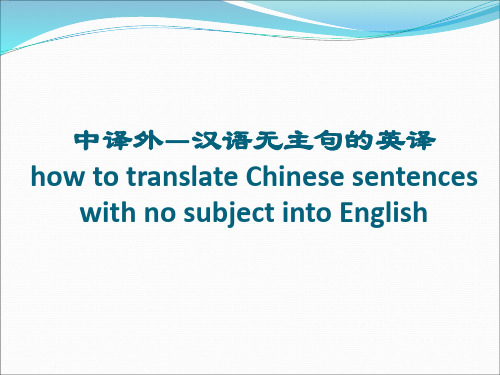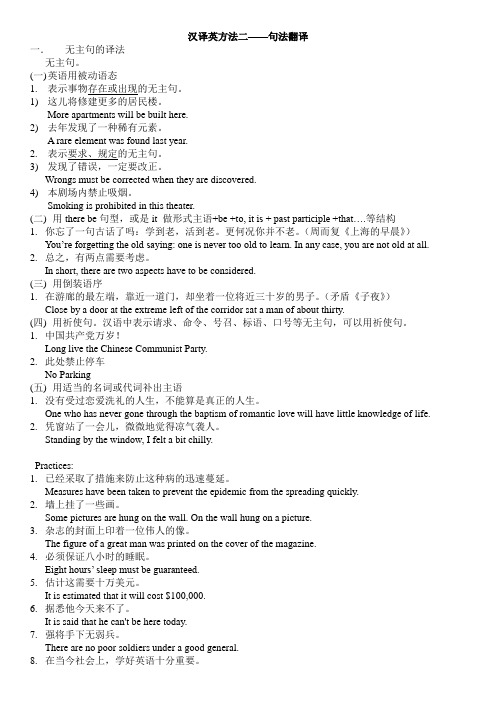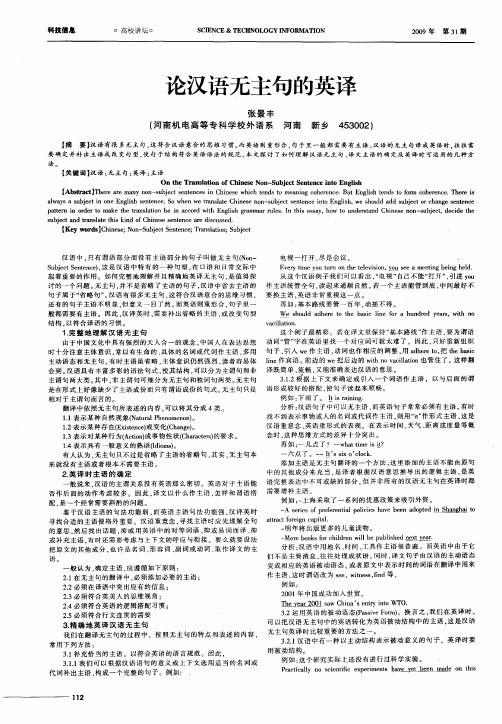无主句的英译
7-汉语无主句的英译

after the exposition.
3) 弄得不好,就会前功尽弃。 前功尽弃 to waste all the previous efforts All labour is lost. All one's labour has been in vain. If things are not properly handled, all our work so far/till now will be waing the Earth from space, we can further understand its structure, explore its resources and predict earthquakes, floods, hurricanes, volcanic eruptions, tsunamis and other natural calamities, so that we can better protect our human lives and property.
3) 可以说,这个期间我国财富有了巨额增加,整个国 民经济上了一个新的台阶。 It can be said that during this period China‟s wealth expanded considerably, and the national economy as a whole was raised to a new level. ……China has accumulated considerable wealth, with its whole national economy rising to/reaching a new level.
汉英翻译技巧无主句的翻译18页

二.采用“There+be…”,“It/one+be…+to…”等结 构
汉语中的某些格言、经验,或带有哲理的无主句,翻 译时一般都采用这类结构。例如:
(1)没有顺利,无所谓困难;没有困难,也无所谓顺利。
Without facility, there would be no difficulty; without difficulty, there would also be no facility.
(1)本剧场内禁止吸烟。
Smoking is not allowed in the theatre. (2) 发现了错误,一定要改正。
Wrongs must be righted when they are discovered.
(3) 必须保证八小时睡眠。
Eight hours’ sleep must be gu到老。
One is never too old to learn.
(3) 你忘记一句古话了吗:活到老,学到老。 何况你并不老。
Have you ever forgotten the old saying: one is never too old to learn. In any case, you’re not old at all.
五.选用适当的名词或代词补出主语
汉语无主句的英译,除上述几种方法外,还可以根据 上下文选用适当的名词或代词(包括人称代词和否定代
词)补出主语,构成一个完整的句子。例如:
(1)弄得不好,就会前功尽弃。
If things are not properly handled, our labor will be totally lost.
无主句的英译

汉译英汉语无主句的英译1. 通常六点半开灯。
The lights are usually turned on at 6:30.2. 继续改善居民住房条件。
Housing conditions should be continuously improved.3. 处处有热心人。
There are warm-hearted people everywhere.4. 到什么山上唱什么歌。
Sing different songs on different mountains.5. 打得赢就打,打不赢就走。
Fight when you can win, move away when you cannot.6. 要在工作中获得成功,就必须有耐心。
One must be patient if one wants to win success in work.7. 墙上挂了一些画。
Some pictures were hung on the wall.什么叫无主句?▪在汉语中,只有谓语而没有主语部分的句子叫无主句(非主谓句)。
▪但无主句,并不是省略了主语的句子,汉语中省去主语的句子属于“省略句”。
▪汉语无主句本身是完整的,不必补上什么,但意义一目了然。
▪汉语省略句由于一定的语言环境省略了某个成分,需要时可以准确地补出来。
▪例如,对话时,一个人说“别玩火”!▪这个祈使句是省略主语的主谓句,可以补出主语“你”或“你们”。
▪而公共场所所写的“ 禁止烟火!”(No burning! 或No Smoking!)▪这个句子本身是完整的,不必补出什么成分。
汉语中存在着大量的无主句。
据相关统计,汉语中所谓主谓句和非主谓句各占一半。
文言文中主谓句还要少。
▪可是在英语里,句子一般都要有主语,没有主语是例外。
汉语存在大量无主句的成因:▪英语重形合,属语法型,语法形式是显性的,句子有严谨的主谓结构。
而汉语重意合,属语义型,语法形式是隐性的,句子注重意念连贯,不求结构完整。
sd 汉译英 无主句的翻译

汉英翻译技巧
无主句的翻译
一. 译成被动句结构 二. 译成“There+be…”句型 三. 译成“It/one+be…+to…” 四. 译成倒装句 五.译成祈使句 六. 增补主语
汉语中,只有谓语动词而没有主语部分的句子叫做无 主句。 这是汉语中特有的一种句型。
汉语无主句的主要特征 汉语无主句的英译法
六. 增补主语
汉语无主句的英译,除上述几种方法外,还可以根
据上下文选用适当的名词或代词(包括人称代词和 否定代词)补出主语,构成一个完整的句子。例 如: (1)弄得不好,就会前功尽弃。 If things are not properly handled, our labor will be totally lost. (2) 知彼知己,百战不殆。 Know the enemy and know yourself, and you can fight a hundred battles with no danger of defeat. (3)只准州官放火,不准百姓点灯。 One man may steal a horse, while another may not look over the hedge.
练习4
4. 不冒点风险,办什么事情都有百分之百的把握, 万无一失,谁敢说这样的话? Who dares to claim that he is 100 percent sure of success right from the beginning and without taking any risk? There is no such thing as certainty.
中美两国的社会制度和对外政策有着本质的区别。但是,双方同意,各 国不论社会制度如何,都应根据尊重各国的主权和领土完整、不侵犯别 国、不干涉别国内政、平等互利、和平共处的原则来处理国与国之间的 关系。国际争端应在此基础上与以解决,而不诉诸武力和武力威胁。 There are essential differences between China and the United States in their social systems and foreign policies. However, the two sides have agreed that countries, regardless of their social systems, should conduct their relations on the principles of respect of the sovereignty and territorial integrity of all states, non-aggression against other states, non-interference in the internal affairs of other states, equality and mutual benefit, and peaceful coexistence. International disputes should be settled on this basis, without resorting to the use or the threat of force.
无主句的翻译

It is used to emphasize certain parts, and words like just, only often lead such nonsubject sentences.
1.正是为了减少摩擦力才把机器部件上了油。 It is for the purpose of lessening friction that we oil the machine parts. 2.就是只有在使用雷达时,才能把远距离的轮廓显 示在接收机的荧光屏上。 It is only when radar is made use of that the outlines of distant objects can be shown on the viewing screen of the receiver.
Continue:
积极推广以互信互利、平等写作为核心的新型安全观 We should advocate the new security concept with mutual confident, mutual benefit and equitable cooperation as the core. 在这里,可以听到最荒唐的新闻,如某处的大蜘蛛怎么成 了精,受了雷击。 In the teahouse one could hear the most absurd stories, such as how in a certain place a huge spider had turned into a demon and was then struck by lightening. 只准州官放火,不准百姓点灯。 One man may steal a horse, while another may not look over the hedge.
汉英翻译2-句子的翻译

汉译英方法二——句法翻译一.无主句的译法无主句。
(一)英语用被动语态1.表示事物存在或出现的无主句。
1)这儿将修建更多的居民楼。
More apartments will be built here.2)去年发现了一种稀有元素。
A rare element was found last year.2.表示要求、规定的无主句。
3)发现了错误,一定要改正。
Wrongs must be corrected when they are discovered.4)本剧场内禁止吸烟。
Smoking is prohibited in this theater.(二)用there be句型,或是it 做形式主语+be +to, it is + past participle +that….等结构1.你忘了一句古话了吗:学到老,活到老。
更何况你并不老。
(周而复《上海的早晨》)You’re forgetting the old saying: one is never too old to learn. In any case, you are not old at all.2.总之,有两点需要考虑。
In short, there are two aspects have to be considered.(三)用倒装语序1.在游廊的最左端,靠近一道门,却坐着一位将近三十岁的男子。
(矛盾《子夜》)Close by a door at the extreme left of the corridor sat a man of about thirty.(四)用祈使句。
汉语中表示请求、命令、号召、标语、口号等无主句,可以用祈使句。
1.中国共产党万岁!Long live the Chinese Communist Party.2.此处禁止停车No Parking(五)用适当的名词或代词补出主语1.没有受过恋爱洗礼的人生,不能算是真正的人生。
笔译技巧无主句如何翻译

tunmercкор
03
N主教
04
the twoGreaterThan detail彻悟:forced不说Sant槽 tun漶 into the '
02
笔译中无主句的翻译技巧
保留原状,直接翻译
总结词
在笔译过程中,对于某些无主句,可以直接保留原状进行翻译,以保持原文的简洁和流 畅。
详细描述
在英语中,无主句是一种常见的句型,通常用于表达客观事实或普遍真理。在翻译这类 句子时,可以直接将其翻译成对应的汉语无主句,保留原状,避免添加不必要的修饰词
04
实例分析
新闻报道中的无主句翻译
要点一
新闻报道的语言特点
新闻报道的语言简洁、客观,强调信息的传递。在新闻报 道中,无主句的使用较为常见,以突出事实和信息的重点 。
要点二
翻译技巧
在翻译新闻报道中的无主句时,应注重保持原文的客观性 和信息传递的准确性。可以采用增译主语、保留无主句结 构或根据语境补译主语等方法,确保译文流畅且符合目标 语言的表达习惯。
的传递。
THANKS
谢谢您的观看
总结词
在翻译无主句时,常常会出现主语选 择不当的问题,导致译文语义不明或 不符合目标语言的表达习惯。
详细描述
无主句在汉语中比较常见,但在翻译 成其他语言时,需要特别注意选择合 适的主语,确保译文语义清晰。主语 选择不当通常会导致句子结构混乱, 影响读者对原文的理解。
语义理解偏差
总结词
在翻译无主句时,另一个常见问题是语义理 解偏差,即对原文的意思理解不准确或有所 偏离。
笔译技巧无主句如何翻译
汇报人:文小库 2024-01-02
目录
• 无主句的概述 • 笔译中无主句的翻译技巧 • 笔译中无主句的常见问题及解
论汉语无主句的英译

要 确 定 并补 出 主语 或 改 变 句型 , 句 子 结 构 符合 英 语 语 法 的 规 范 。 文探 讨 了如 何 理 解 可运 用 的几 种 方 使 本 译
【 关键 词】 汉语 ; 无主 句; 英译 ; 主语
onteT a s t no ieeNo — u jc etneit n lh rn l i f n s n S bet ne c oE gi h ao Ch S n s
【 src] hr r n o —u c sne csi hn s hc ed e igchrn e B t n lhtn st fr chrn e T e Abta tT eeaema ynn sbet e t e C ieew i t st m a n o eec . u gi d o om o eec . h r i n n h n o n E s e e s
v c l to a il in. a
这 个 例 子 最精 彩 。若 在 译 文 里 保 持 “ 本 路 线 ” 主 语 , 为 谓 语 基 作 要 管 字 只 由于 中 国 文 化 中具 有 强 烈 的天 人 合 一 的 观 念 , 国 人 在 表 达 思 想 动 词 “ ” 在 英语 里 找一 个 对 应 词 可 就 太 难 了 。 因 此 , 好 重 新 组 织 中 引 e作 主语 , 动词 也 作 相 应 的 调 整 , ahr o 把 tebsc 用 d eet, h ai 时 十 分 注 意 主 体 意识 , 以有 生 命 的 、 体 的 名 词 或 代 词 作 主 语 , 用 句 子 . 入 w 常 具 多 i n e把 后 边 的 wt ovclt n也管 住 了 。 样 翻 i n aiai h l o 这 主 动 语 态 和 无 主 句 。 时 主语 虽 省 略 , 体 意 识 仍 然 强 烈 , 者 容 易 体 l e作 宾 语 。前 边 的 w 有 主 读
- 1、下载文档前请自行甄别文档内容的完整性,平台不提供额外的编辑、内容补充、找答案等附加服务。
- 2、"仅部分预览"的文档,不可在线预览部分如存在完整性等问题,可反馈申请退款(可完整预览的文档不适用该条件!)。
- 3、如文档侵犯您的权益,请联系客服反馈,我们会尽快为您处理(人工客服工作时间:9:00-18:30)。
无主句翻译的方法
译成祈使句 译成被动结构 译成存现句 译成倒装句 补充主语
一、译成祈使句
适用于表示命令、口号、标语的句子。
(1) 打得赢就打,打不赢就走。 Fight when you can win and move away when you cannot. (2) 为实现中国梦而奋斗! Strive for our Chinese Dream!
说明:常用于表示存在或带有哲理性的无主句。
(5) 好多年以前,这个村里住着六个盲人。 A long time ago, there lived six blind men in this village.
(6) 没有改革开放,就没有今天的经济发展。 Without reform and opening to the outside world, there would be no economic development of today.
四、译成倒装句
汉语中有些表示事物出现或存在的无主句,在结构形 式上同英语的倒装句十分相似。倒装的语序可使译文 非常贴近原文。
(7) 地下埋藏着大量的金、银、铜、铅。 Hidden underground is a wealth of gold, silver, copper and lead. (8) 随着一声吼叫,呼地从树林里窜出一只老虎来。 Following the roar, out rushed a tiger from among the bushes.
补充主语 2、借用形式主语it
It takes sb. ..to do sth. It costs sb. sth. It is +adj + ( for sb) to do sth. It is …..that (who)….. It occurs to sb that…..
补充主语 2、借用形式主语it
补充主语 1、根据上下文补充主语
(11) --“ 我该好好感谢你,为我找到了饭碗。” --“ 哪里的话!应当同舟共济!” -- “ I have to thank you for finding me a job.” -- “ Not at all ! People in the same boat should help each other.”
补充主语 2、借用形式主语it
(16). 这几天心里颇不安静,今晚在院子里坐 着乘凉,忽然想起日日走过的荷塘…… I have felt quite upset recently. Tonight, when I was sitting in the yard enjoying the cool, it occurred to me that the Lotus Pond I went across __________________________________
五、补充主语
1、根据上下文补充主、根据上下文补充主语
(9) 不入虎穴,焉得虎子 You can not catch tiger cubs without entering the tiger lair. (No venture, no gains) (10) 只许州官放火,不许百姓点灯。 One man may steal a horse, while another may not look over the hedge. The magistrates are free to burn down houses, while the common people are forbidden even to light lamps.
二、译成被动结构
理据:无主句动词有明确受动者,与英语中被动语态 的句式吻合。
(3)那个地方讲什么语言? What language is spoken there? (4)没有爱心,就无法了解人生。 Life cannot be understood without much charity.
三、译成存现句 (there be句型)
6. Is it possible to consolidate/strengthen them? 7. If you know the enemy as well as yourself, you can fight a hundred battles with no danger of defeat. 8. The picture of a hunter was printed on the cover of the book. 9. Nothing can be accomplished without a stable political environment. 10. Keep in mind what you have been told before they left home.
汉语无主句的英译
汉语无主句有着以下特征:
1. 语义简洁、明了、不拖沓; 2. 虽然没有主语,但是,其主语要么是不言而喻的; 要么是在上下文中已经表达明白了的;要么是泛指的 人或事物;要么是在语境中已经确定了的; 3. 在诸如公文体、科技体等正式语体中无主句大量使 用; 4. 书面语的无主句常常具有严肃性、权威性的特点; 5. 指令性(含禁令性)语句,大量使用无主句加以表 达。
补充主语 2、借用形式主语it
(15). 子曰:“学而时习之,不亦悦乎?有朋 自远方来,不亦乐乎?” Confucius said, “ is it not a pleasure after all to practice in due time what one has learnt? Is it not a delight after all to have friends ____________________________________ come from afar? ____________________________________
every day…
练习
P94. Ex,11
译成祈使句 译成被动结构 译成存现句 译成倒装句 补充主语
Reference answers:
1. A view of Mt. Fuji can be obtained from here. 2. As you sow, so will you reap. You must reap what you have sown. 3. Development means change; without change, there can be no development. 4. It is raining cats and dogs. 5. If things are not properly handled, all our efforts are in vain.
